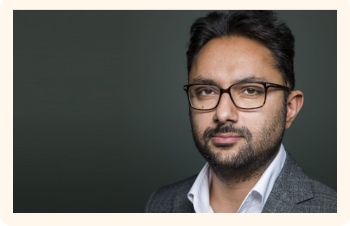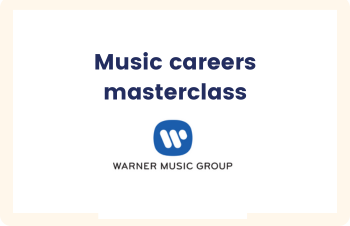Did you know that 89% of people listen to the radio each week? And it’s a growing sector with podcasts and smart speakers rapidly gaining in popularity. In our latest masterclass, we headed up to the BBC MediaCity offices in sunny Salford to dive into the world of audio, hearing all about the wealth of roles on offer and the skills you need to succeed in the industry!
Panel:
- Dean McCullough (host) – radio presenter, BBC Radio 1
- Priya Matharu- assistant producer, Hits Radio
- Rohan Sethi – producer, BBC Sport (Creative Access alumni)
- Rebecca Gaskell – head of production, Reform Radio
First things first: How do you get in?
Our panelists all stressed that the best place to start is by gaining some experience though community or student radio, after all, this is how they all cut their teeth in the industry!
For Rebecca and Priya, they both fell in love with radio at university. Whereas Rohan had been volunteering at community radio from the age of 14 before he broke into the industry via a Creative Access internship, and Dean has been a presenter everywhere from Riverside Radio in London to Gaydio in Manchester.
Priya’s biggest tip is to always follow up with any connections you make. She works at Hits Radio’ local breakfast shows across the West Midlands, Staffordshire and Cheshire and has covered on BBC West Midlands and BBC Radio 1. Her route into her job at Bauer (Hits’ parent company) came after taking part in Kiss Summer School, when she contacted the person who ran the summer school and said, “I’m based in Birmingham, do you have any roles coming up in the area?” and they had positions at Hits. Priya assured our audience: “There’s no harm in asking – the answer is always no if you don’t ask”.
Dean couldn’t agree more explaining that he literally knocked on the door of Gaydio’s offices when he first moved to Manchester in 2018 whilst in the building to meet a friend working on a different floor. He told our audience that if you are going to try this method, make sure you research before you approach the organisation, but ultimately, he said the most important thing is to: “Believe that you deserve to be sat at that table”

What key skills do I need?
Rohan is currently a producer at BBC Sport but has worked in different departments at BBC, including 1xtra, since he started as a Creative Access intern at Five Live in 2015. He loves his job because it’s so varied, telling us that just a couple of weeks ago he was in Saudi Arabia at the Fury vs Usyk on the ground chasing current and former boxers getting social media content. His focus has always been on social media and the digital world and advised our audience to think about what their strengths are when pursuing a career in radio; “There’s so many more jobs than just presenters and producers and you can always switch once you’ve got your foot in your door”.
Dean echoes this point and tells our audience that his boss and current head of Radio 1, Aled Haydn Jones, started out as the tea boy for Chris Moyles!
Speaking with over 15 years’ experience in specialist radio, Rebecca said that what really matters is that the employer can see you’re trying to build these skills versus necessarily having direct radio production experience. She said: “You want evidence that people are dedicated and have demonstrable experience in content creation, even if it’s making Instagram videos, it shows me they can edit and they can tell a story – both of which are transferable skills”
Priya also added that there’s a misconception that you must be ‘naturally creative’ to work in the creative industries, “it’s a learnt skill!”. She said nowadays it’s easier than ever to learn the skills you need to be a producer. You can literally use your mobile phone to record and edit a radio show, or practice editing on TikTok, she advised.
What’s something no one tells you about the industry?
With news dropping recently that only 8% of people working in TV, film & radio are from working-class backgrounds, our audience were keenly aware of how tough it is right now to break into the industry if you’re from an under-represented background. Our panelists were honest about their own struggles juggling full-time paid work and volunteering at community radio stations to gain experience. Whilst breaking into and succeeding in the radio industry takes hard work, our panelists all agreed that it’s worth it once you get there and there are creative ways to navigate the more difficult parts of the industry.
Rohan had a word of warning about short-term contacts, which are really common in the media industry. He said personally he hadn’t been expecting that when he started out, but on a positive note he said, “it did force me into other jobs and now my CV is so varied.” He recommended to always apply for jobs before your current contract has finished and said that you can learn so much from interviews, so don’t be afraid to put yourself out there and apply.
And because the industry is competitive, it pays to be kind to your colleagues! Priya emphasised that radio is a small world explaining that someone she knew from student radio is now in the office at Hits with her. Dean told our audience: “Make friends with the production team and editors as they’re going to help you get your next job!”.
Rebecca chimed in from the perspective of working at the independent Reform Radio: “Indies are on tight budget sand don’t have loads of time to look for new people. So, if you’re there sticking your hand up a lot and saying you can help that’s going to get you a shift and then, hopefully, more regular work”.
Priya also had an amazing tip for anyone who’s feeling frustrated during the job hunt. She told our audience write down all your achievements so “you can reflect whenever you feel down or like you’ve not achieved enough, and you’ll realise you’ve actually done so much”.
Why is diversity so important for the future of audio?
All of our panel are based outside London and it felt fitting to emphasise to our audience in Salford that this a really exciting time for the audio industry across the UK and there are some incredible opportunities in other cities like Birmingham, Manchester and Leeds. Dean wanted our audience to know that “you don’t have to move to London… it’s not the be all and end all”.
While regional and accent representation was certainly on the agenda for a panel, they also told us why it’s so vital to make audio more diverse and inclusive of different audiences. Rohan summed it perfectly: “The mainstream needs diverse content because diverse content is authentic and entertaining. It’s lacking in mainstream but isn’t lacking on social media. The content is stronger if you’ve got a diverse team… So, back yourself if you’re going into these rooms, they need you!”
Meanwhile, Priya said that whilst there’s currently not enough South Asian voices on air and behind-the-scenes, she’s hopeful that change is coming. She said: “You go where you feel seen… if you’re not reflecting, you’re cutting out a big portion of listeners. The big thing with radio is to think about how you can be real and engage new listeners”.
For Dean being a white gay man on radio, he’s aware of his privilege but said it’s his mission to ‘uplift other folk in my community that really need it’.
All of our panel wanted to express to our audience that they deserve to feel confident about their careers and encouraged them to harness their unique skills and experiences. Rebecca ended the conversation by explaining: “The next generation of people coming through are going to shape the future of radio, I’m absolutely listening to what young people have to say so don’t be afraid to tell us what you think”.
A massive thank you goes to our amazing panel for all their honesty and insights into navigating the world of radio! And of course, a big shout out goes to BBC and Radiocentre for hosting us and our audience in Salford for being so engaged and bringing such great questions and stories to the conversation.
Keep your eyes peeled on our opportunities board for our next masterclass!




